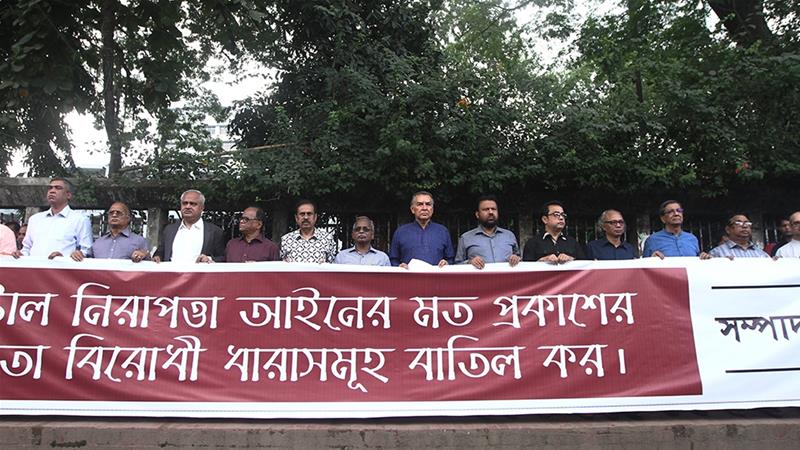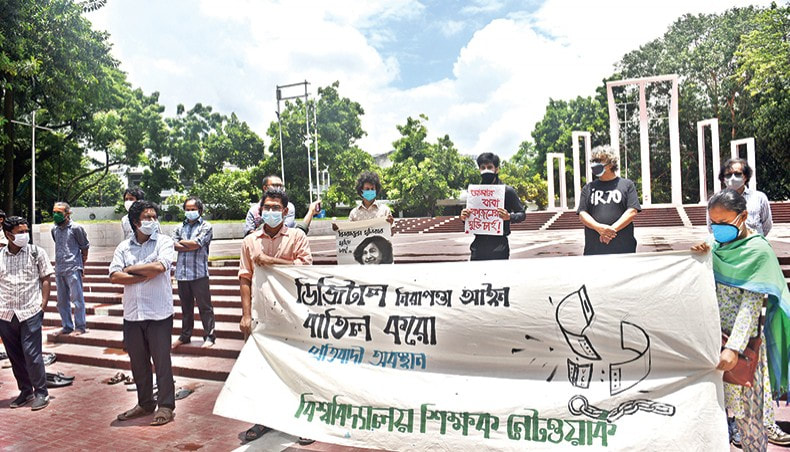ECONOMICS STUDY CENTER, UNIVERSITY OF DHAKA
|
ESC Blog Editorial Team So far, 205 people in total have been arrested under the Digital Security Act in the country this year alone. This includes 53 journalists, 8 students (including a ninth-grader), 20 politicians, 5 teachers, 2 folk artists, 2 RMG workers, a doctor and a cartoonist. Journalists and members of the civil society show growing concern over the unjust and abusive implementation of the act that limits the rights to exercise freedom of speech granted to the citizens by the constitution. The Digital Security Act was introduced back in 2018 to reform the pre-existing ICT act (section 57) introduced in 2006 with the intention to limit freedom of speech in the country. The purpose of the new law as mentioned in its preamble is to “ensure digital security and prevent crimes committed on digital platforms”. Though it was promised by the lawmakers that section 57 of the ICT act would be repealed following the passage of the bill, controversial provisions of section 57 were included in four sections of the new law. Moreover, sections 8, 21, 25, 28, 29, 31, 32 and 43 pose to be even greater threats to free speech and journalistic freedoms, as can be seen from the sheer number of journalists arrested under the act. The provisions under the mentioned sections mostly include hurting religious values, disrupting public order, dishing out defaming information and causing deterioration in law and order by publishing anything on a website or in electronic form. Most of their definitions are vague, and this loophole is being used to channel these provisions towards the interest of certain groups and individuals. Section 43 allows the police to arrest an individual if they believe that an offence under the law has been or is being committed or there is a possibility of committing crimes or destroying evidence. This gives the police an arbitrary authority to arrest a journalist or any individual for that matter just based on a suspicion of a so-called crime being committed in the future. This, combined with the vague provisions introduced by the other sections brings journalism or any sort of expression of opinion under an authoritative regulation, completely disregarding the right to free speech. An act that is said to be fighting cybercrimes, cyber harassments and hate speech is deliberately being channelled against criticisms of the government and reactionary groups. Most of the arrests made in the last few months were based on the grounds of the criticisms of the mismanagement on the government’s part regarding the coronavirus situation. Criticisms were defined as rumours and anti-government propaganda, and hundreds of arrests were made on that basis. What is most alarming is that out of the 20 or so provisions of the law that deal with offences and punishments, 14 are non-bailable. The lowest punishment is 1 year in prison and the highest life-term but mostly in the range of between 4 and 7 years. The implementation of this act is faster and somehow more effective.
This act is posing to be a threat against the right to exercise free speech bestowed upon the citizens of a democratic country. This not only restricts the expressions of opinions and journalistic freedom but also creates fear and intimidation to practice the democratic rights to practice freedom of speech and criticisms of the government and influential reactionary groups. Economics Study Center condemns the arrests based on vague and unjust accusations under the Digital Security Act and hopes that a democratic atmosphere is reinforced in the country where freedom of speech can be practised without fear or intimidation.
0 Comments
Leave a Reply. |
Send your articles to: |




